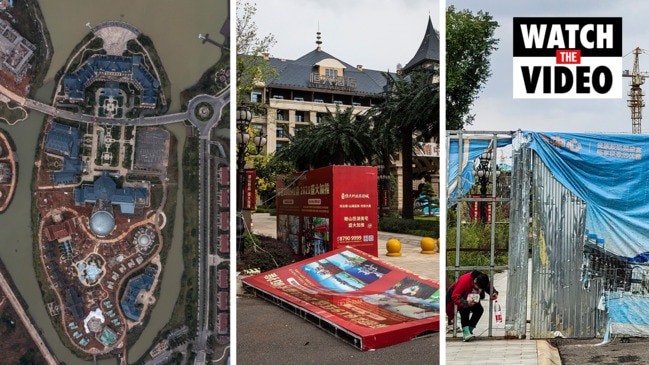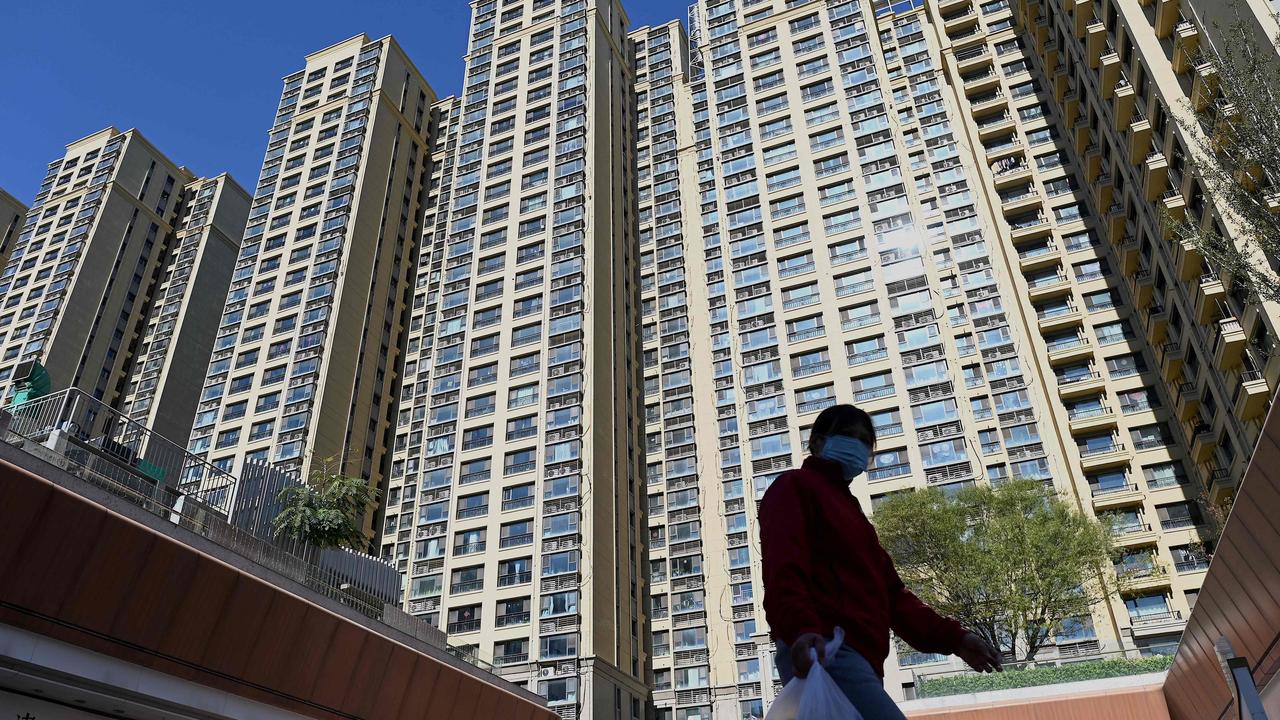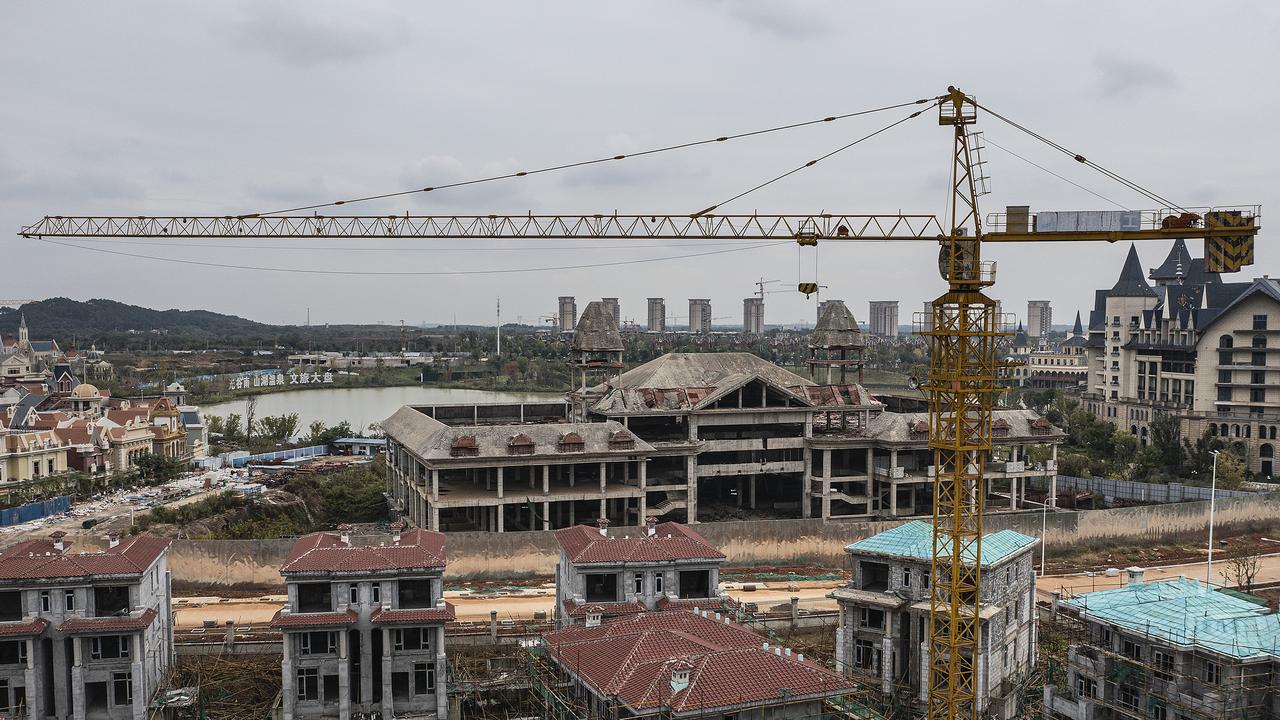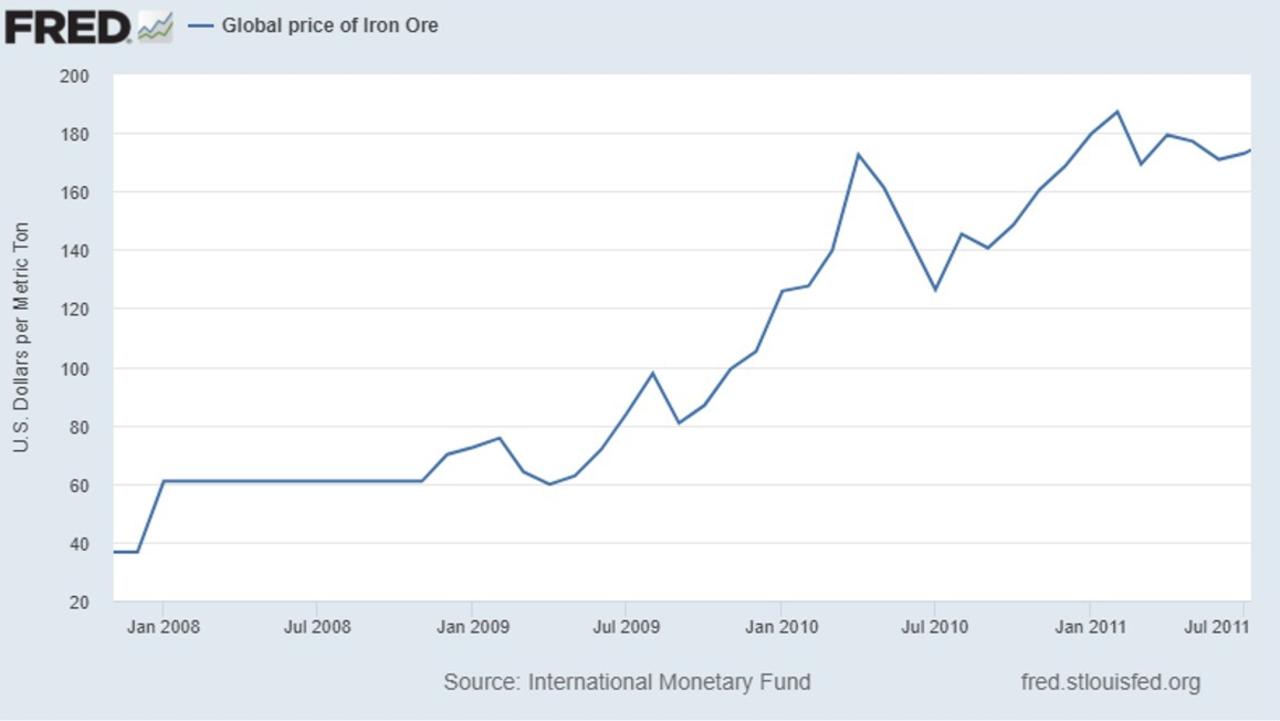China crisis could be a boon for Australia but painful for the world
China’s property market is on the brink of collapse and if Beijing decides to take a particular route to recovery then Australia could benefit big time.

For years analysts and economic commentators have been warning that China’s economy and property sector were effectively a house of cards, a debt binge driven economic growth story that could only ever end in tears.
Yet despite properties in some Chinese cities costing up to 43 times the disposable income of the cities’ inhabitants, both have survived relatively unscathed, largely thanks to the support of the Chinese government.
Every so often a property developer or state-owned enterprise would find itself in trouble after its bets on the property sector went bad, but until recently – pretty much every time – Beijing would eventually come to the rescue if the company was large enough to create risks to the system.

Like a game of chicken between two daredevils on an empty and desolate country road, every so often Beijing and the property sector would stare each other down, knowing that if neither side swerved it could all end in an almighty crash.
So far, Beijing has always swerved every time its opponent was large enough for its potential demise to impact systemic stability.
That was until Evergrande.
Evergrande: The Chinese property sector’s time bomb
In recent months mega developer Evergrande has been making headlines, as it struggles to service more than $US300 billion ($A400 billion) in liabilities.
So far, multiple US dollar bonds have experienced missed payments and bonds issued by others but guaranteed by Evergrande, are on the edge of default. Domestic Chinese investors have so far been somewhat insulated from Evergrande’s woes, but are widely expected to take significant losses.
Yet despite Evergrande’s importance to the Chinese economy and the fact that it has more debt than most of the countries in the world, so far the Chinese government has been reticent to intervene.
An already weak Chinese economy
In the recent release of the Chinese national accounts for Q3, the Chinese economy recorded growth of just 0.2 per cent, a far cry from the 1.2 to 1.5 per cent growth range recorded during 2019.
But what makes this figure really interesting is that it was made public. The Chinese government can claim their economy grew at whatever pace they like, yet they have chosen to put a figure out that shows a Chinese economy in significant difficulty.

Investment bank Citi is even more concerned about China’s growth prospects, forecasting a short period of stagflation driven by high energy prices and the highest producer price rises in decades.
With Chinese retail sales growing by just 2.5 per cent in the past year, compared with 8 per cent pre-Covid, the Chinese Communist Party’s dream of a consumer-driven economy is looking increasingly shaky.
A collision course – Beijing doesn’t swerve
If the Chinese government continues on its current course and pursues a restructuring of Evergrande with heavy losses for investors rather than a more traditional bailout, the Chinese property sector and the broader economy will take a significant hit.
In a paper authored by Harvard university economy Kenneth Rogoff and Beijing Tsinghua University’s Yuanchen Yang, it was concluded that in 2016, real estate-related activities in China accounted for 28.7 per cent of GDP.
With housing prices now falling across the 51 major markets monitored by the China International Capital Corporation at a rate of 1.7 per cent in September, the stakes of Evergrande saga and the Chinese property market woes more broadly continue to rise.
Please note there are multiple Chinese house price indices.
— Avid Commentator 🇦🇺 (@AvidCommentator) October 20, 2021
One is based on the prices of newly built homes in 70 cities & based on Beijing's data (-0.1% in Sep)
Another (which I have cited recently) includes existing homes, covers 51 cities & is independent (-1.7% in Sep) pic.twitter.com/tpqvk7Z3E4
Rogoff and Yang concluded that Chinese households’ consumption was “significantly more sensitive to a decline in housing prices”, when contrasted with those in other nations such as the United States or Japan.
A “20 per cent fall in (Chinese) real estate activity could lead to a 5 to 10 per cent fall in GDP, even without amplification from a banking crisis, or accounting for the importance of real estate as collateral”.
For an economy that has become accustomed to 6 per cent to 10 per cent growth year after year over the past decade, any protracted fall in growth of that magnitude would come as quite the shock to Chinese households.
What happens if Beijing swerves in its game of chicken?
Currently it appears unlikely that President Xi and the Chinese government would swerve in its game of chicken with the property sector, but it’s worth exploring what may happen if they did.
What if a more serious than expected deterioration in property sector forced the Chinese government to fall back into old habits? To once again throw the kitchen sink at a construction-driven stimulus as it did during the global financial crisis.
If Beijing was forced to once again pursue this type of strategy, it’s likely that commodity prices would rise significantly, despite already sitting at or near record highs.
It wouldn’t be the first time.
For example, in December 2007 just prior to the GFC, global iron ore prices sat at just $US36 ($A48) per ton. Less than 2.5 years later the explosion in demand had seen them rise to over $US180 ($A240) per ton.

Rising commodity prices would be a huge boon to the Australian economy in much the same way it was during the GFC era.
But there would be risks for China and the world.
As it stands, Chinese producer prices are currently rising at a rate of 10.5 per cent over the past 12 months – a 26 year high.
#China's producer price index climbed 10.7% from a year earlier, beating forecasts and reaching the highest since November 1995, as #coal prices and other commodity costs soared.#PPIhttps://t.co/eMdP30fshFpic.twitter.com/nuw6PKp5do
— CN Wire (@Sino_Market) October 14, 2021
If Beijing was to throw caution to the wind and pursue another construction-driven stimulus, it’s likely that it would drive even greater levels of inflation than the world is already experiencing.
This would put greater stress on households and businesses already facing the challenge of rising prices, as well as placing further pressure on central banks to raise interest rates.
In the issues faced by the Chinese property sector, there are no longer any easy answers. Beijing could once again kick the can down the road, but now that also has significant costs and further fuels systemic risk.
Or Beijing can continue its course and accept the inevitable damage allowing a significant slowdown in the property sector will bring, in the hopes that it averts an even greater crisis some time further down the road.
Tarric Brooker is a freelance journalist and social commentator | @AvidCommentator






